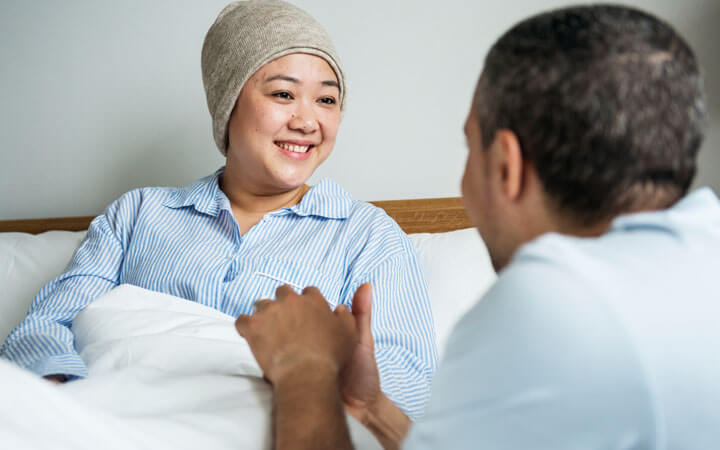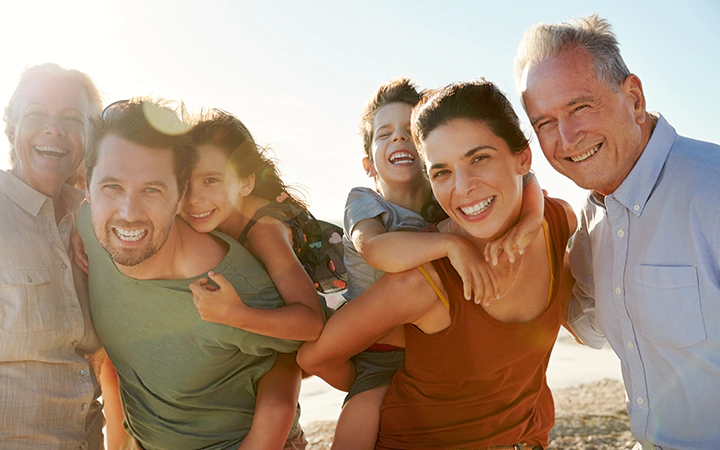Finding out your loved one has cancer can be devastating. Cancer affects not only the person who’s been diagnosed but also those who care about that person.
You may be wondering, ‘How can I help?’ or ‘What should I do now?’ This article is for you if your loved one has been told that they have advanced cancer that is no longer responding to treatment.
It explores many of the questions that you may be facing right now. This article also covers important reminders for cancer caregivers.
Who is a Caregiver?
You may not consider yourself a caregiver. You may look at what you’re doing as something natural; after all, you’re taking care of someone you love.
However, if you are helping someone who has cancer, you are considered a ‘caregiver’.
There are different types of caregivers – some are family members, while others are friends.
Every situation is different, so there are also different ways to give care. There isn’t one way that works best.
Caregiving can mean helping with everyday tasks, such as meal preparation, mobility assistance, and doctor visits.
But it can also happen long distance, when you are coordinating services and care by email or phone.
Caregiving can also mean giving spiritual and emotional support. You may be helping your loved one cope with their disease.
Listening, talking, and just being there for them are some of the most important things that you can do.
Helping Your Loved One Cope With Advanced Cancer
Your loved one may be struggling with stage 4 cancer. Doctors may be saying that they are no longer responding to treatment.
You may have been informed that long-term remission isn’t possible. Or, your loved one may have decided to discontinue treatment and live out their days at home.
During this time, new decisions may have to be made. Shifts in care may be necessary or may already be taking place.
The burden of making these decisions together may seem more difficult than it used to be.
Often, these choices come with many emotions such as anger, sadness, anxiety, and fear of the unknown.
Talking about these issues may feel like you’re giving – but you aren’t. It doesn’t mean that you’re giving up hope.
Having information about how to manage difficult situations can help; after all, some people cope better when they have different options.
Making Decisions Together
You may have been caring for your loved one for a short or a long time. Most likely, you’ll be involved in helping make decisions about next steps for care.
Some of these choices may include financial decisions, treatment goals, and when to use hospice care. When diagnosed with advanced cancer, people often have different care goals.
Some want to keep following more aggressive treatments, while others decide to choose other paths. Some may want to stop treatments altogether.
You may wonder, ‘Should we try another treatment?’, ‘Have we done everything to treat the cancer?’ or ‘What’s the best that we can hope for by trying another treatment?’
It’s natural to want to do everything that you can, but you should weigh these feelings against the positives and negatives for your loved one. It’s best to work together on this process.
Understanding and Respecting Your Loved One’s Wishes
For many families, it’s important that your loved one is in charge of making decisions. But in some families, it’s common for the caregiver to make most of the decisions – and they may make them with or without the patient’s knowledge.
Or sometimes, the patient wants the caregiver to make all of the decisions. There may also come a time when you have to make decisions for your loved one because they can no longer do so.
When this happens, it’s important to understand and respect your loved one’s wishes. How would they like to deal with the situation?
This may mean letting go of some opinions or thoughts that you have about treatment. For instance, you may want to keep your loved one alive, whatever it takes.
But they may want to sign a do-not-resuscitate order (DNR) at a certain point. In such cases, it’s important that you respect your loved one’s wishes.
Choices for Care
There are several options for your loved one’s cancer care. These depend on the type of cancer and the patient’s care goals. These options include:
- Palliative Treatment
In advanced cancer, palliative treatment may be given to help the patient feel better, even if it isn’t intended to treat cancer.
For instance, doctors may give chemotherapy to slow the growth of a tumor that’s causing pain.
Or surgery may be performed to remove a mass that’s pressing on certain nerves and causing pain.
- Hospice Care
Choosing hospice care doesn’t mean that you’ve given up – it simply means that you want your loved one to live as comfortably as possible.
The goal of hospice is to help patients live each day to the fullest by making them as comfortable and symptom-free as possible.
Hospice doctors, nurses, social workers, chaplains, and volunteers are specially trained – they dedicate themselves to supporting the emotional, spiritual, and social needs of both patients and their families, as well as dealing with the patient’s medical symptoms.
Most people believe that hospice is only available in the last weeks or days of life – the fact is, hospice can provide support for much more than a few weeks.
- Home Care
Home care services are ideal for patients who wish to get medical care at home, rather than in a hospital.
Home care services may include care monitoring, medication assistance, symptom management, providing medical equipment, physical and other therapies, and more.
Caring for the Caregiver: Reminders for Caregivers
During this time, the natural response of most caregivers is to put their own needs and feelings aside – they try to focus on the patient and the many tasks of caregiving.
While this may be fine for a little while, it can be difficult to keep up for a long time – and it’s not good for your health.
Remember, if you don’t take care of yourself, you won’t be able to take care of your loved one.
Here are some reminders for caregivers:
- Find Your Support System
Cancer patients need all of the support that they can get – but as a caregiver, you need to find your own support system too.
Caring for your loved one with cancer can be difficult – physically and emotionally. So, find other people who can support you. Talk to your other family members.
Reach out to your friends. Look for other caregivers – many people find that talking to other caregivers who are coping with loneliness, uncertainty, or stress helps them become better caregivers.
- Know Yourself
Recognize your own strengths and weaknesses as a caregiver – this allows you to set boundaries and know when to ask for help.
Setting limits can help you and the person you are taking care of. The person you’re taking care of can have some independence, while you can catch a break.
It’s important to recognize when you need a break so that you don’t feel burned out.
- Gather Information
There is truth to the popular phrase, ‘Knowledge is power.’ When your loved one is diagnosed with cancer, a lot of information will be given to you.
It’s important to be aware of the facts and get proper information. Don’t hesitate to ask your healthcare team some questions.
- Take Breaks
Taking breaks is an easy way to lower your stress and replenish your energy.
Try simple activities like taking deep breaths or closing your eyes for 10 minutes in a comfortable chair.
Taking time for yourself is not selfish – it’s necessary. Seek ways to replenish your energy and rejuvenate your spirit.
- Be Mindful of Your Own Health
In order to take care of your loved one, you need to take care of yourself too. Be mindful of your own health.
Get regular checkups and screenings. Eat well. Exercise. Stay hydrated. Get enough sleep.
- Feel Your Own Emotions
You are human. Allow yourself to experience your own emotions. When you acknowledge and deal with your own feelings, you are able to be present for your loved one.
- Be Present
The best thing that you can do for a loved one with a cancer is to be there for them. Listen to them and be present.
- Recognize a ‘New Normal’
Both patients and caregivers report feeling a loss of control after a cancer diagnosis.
Acknowledging and learning how to manage this loss of control and care for your loved one will lead to a ‘new normal’ – a new understanding of what your life is like now.
It may also help to acknowledge that your relationships, home life, and finances may change for a period of time.
Try to manage each day’s priority as it comes.
- Make Time for Fun
Plan something fun to do with your loved one to get your mind off their condition.
Watch a funny movie, have a family dinner, or play your favorite board games.
Taking time for fun will remind you of your special bond and help both of you de-stress.
- Ask for Help
It’s okay to ask for help – everyone has their own limits and there’s only so much time in a day to accomplish everything.
Let your family or friends assist with errands, childcare, or even caring for the patient.
Attend a support group where you can learn from other caregivers.
Asking for help can make the cancer caregiving process much more manageable.
The Bottom Line
As a caregiver, you try to maintain a balance each day. You have to care for your loved one while keeping up with the demands of family and work.
Your focus tends to be on the patient’s needs; however, it’s also up to you to try to stay in tune with yourself.
Remember, if you don’t take care of yourself, you won’t be able to take care of your loved one.









